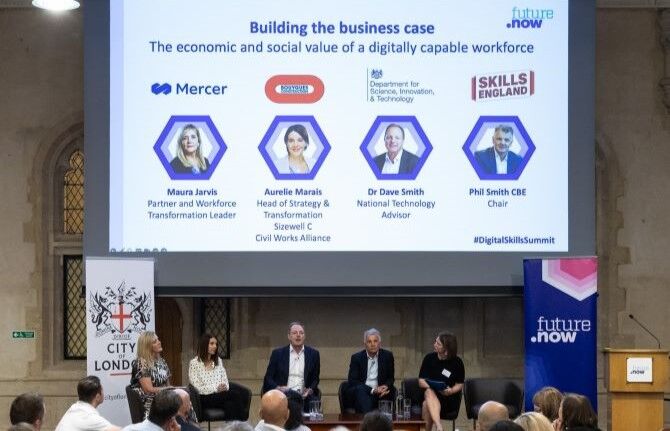Closing the UK’s digital skills gap
The Workforce Digital Skills Summit at the historic London Guildhall addressed how to uplift the widespread lack of digital skills among working-age adults and the universal benefits of upskilling. Ledetta Asfa-Wossen finds out more.

This article is taken from the Summer 2025 issue of
Think Global People magazine
View your copy of the Summer 2025 issue of Think Global People magazine.There is a critical gap in essential digital skills among UK workers. A knowledge gap that has nothing to do with coding, programming or even specialist data and AI skills.According to the coalition Future Dot Now, more than half of UK workers are missing basics like fundamental online safety skills and being able to use digital collaboration tools. “Today, the majority of the UK labour force lack the full suite of digital capabilities industry and government agree are essential for work. Closing this skills gap is critical for boosting growth and productivity, embracing emerging tech like AI, and breaking down barriers to opportunity for all. The UK needs a Great Digital Catch Up, with every member of the UK workforce, paid or voluntary, supported to build the digital foundations required for work today and in the future,” said Liz Williams MBE, chief executive, Future Dot Now.The pervasive gap exists across all regions and demographics leaving many unable to access good jobs or essential public services.“There are over 21 million working-age adults who cannot do all 20 digital work tasks outlined in the Essential Digital Skills Framework – 52% of the labour force. Every one of those people is someone like you, or like me. And, there are 2.3 million people in the UK who can’t complete any of them – but it’s a huge opportunity,” added Williams. “We need to reach all these people, and fast, because let’s face it, the tech is not going to wait.”
 Tammy Fevrier, Department for Work and Pensions, Peter Cheese of CIPD, and Dr Matthew Forshaw of the Alan Turing Institute debated a rapidly evolving landscapeSo, what are the essential digital tasks that everyone in the UK workforce must be able to complete? The 20 tasks identified by government and industry come under five core areas.
Tammy Fevrier, Department for Work and Pensions, Peter Cheese of CIPD, and Dr Matthew Forshaw of the Alan Turing Institute debated a rapidly evolving landscapeSo, what are the essential digital tasks that everyone in the UK workforce must be able to complete? The 20 tasks identified by government and industry come under five core areas.Handling information and content
1. Being able to follow an organisation’s IT policies when sharing information anywhere2. Securely access, sychronise and share information across different devices e.g. calendarsCommunicating
3. Communicate at work digitally using messaging applications e.g. MS Teams, Slack4. Use workplace digital tools to create, share and collaborate with colleagues e.g. OneDrive, WeTransfer5. Set up and manage an account on a professional online network/community/job site e.g. LinkedInTransacting
6. Complete digital records on behalf of, or within an organisation e.g. absence, tax returns7. Access salary and tax information digitally e.g. password protected payslipsProblem solving
8. Be able to find information online that helps solve work-related problems9. Able to improve skills and ability to do new things at work using online tutorials, learning platforms and how-to-guides10. Use appropriate software that is required of day-to-day job e.g. spreadsheets11. Improve own and/or the organisation’s productivity using digital tools e.g. TrelloBeing safe and legal online
12. Act with caution online and understand that there are risks and threats involved in carrying out activities13. Follow data protection guidelines online14. Recognise suspicious links and know that clicking on these links or downloading unfamiliar attachments is a risk15. Being careful with what is shared online and understanding that online activity produces a permanent record that can be accessed by others16. Respond to any requests for authentication for online accounts17. Identify secure websites e.g. looking for padlock and https18. Identify secure Wi-Fi networks to connect to19. Update device software/operating systems as and when necessary to prevent viruses and other risks20. Set privacy and marketing setting for websites and all accounts e.g. managing cookies, updates and preferences

Read related articles
- Stay or go? Career curation in the Big Reskill
- Pivoting to a career in tech
- How to teach future-readiness
- New report shows global skill-shortage hotspots
Building for future disruption
Research also shows that no sector is immune to this gap. The Lloyds Bank UK Consumer Digital Index Report states 20% of the tech sector cannot complete all 20 essential digital tasks. While the construction sector has the lowest levels of essential digital skills – with only 35% able to do all 20 work tasks.Starting off proceedings was guest speaker Baroness Jones, Minister for the Future Digital Economy and Online Safety, to help set the scene.“On the one hand we have a job market that feels a bit turbulent. Where people feel there’s not as many opportunities. Then I hear young people I visit in schools say they don’t necessarily see a career in tech, or view it as an option for them. Meanwhile, employers around the country doing really exciting work have a huge number of vacancies that they are struggling to fill because they simply can’t find people with the right skills. We have to deal with that anomaly.”Jones stressed a lack of digital skills is leaving ‘jobs sitting empty’ up and down the country – not just in London and the Southeast and urged more employers to help close the gap.“When we think of digital skills we often think about children or teenagers. They are a big part of the future we are trying to build but closing the skills gap among working adults is a vital part of that puzzle. These skills are necessary across all jobs, no matter what field.”The essential digital skills gap will be worsened by automation and AI and if not addressed could exasperate inequalities. Furthermore, over half of UK employers say their staff don’t yet have the skills to leverage generative AI.“We can act now, to help people participate in the future economy,” said Jones. “We know that for every £1 invested in digital skills training – £9.48 can be gained.”Return on investment
New Future Dot Now research was previewed on the day quantifying the economic value of improving digital skills and the positive long-term impact of employee training.Researchers shared that employer-led digital training was proven to create more highly-skilled and productive staff than when they were trained elsewhere outside of work.Improving digital skills of UK individuals in full-time work was shown to boost pay by an estimated £897 per year. The data also illustrated how upskilling job seekers unlocks more opportunities.For businesses, and the wider economy, the numbers shared were compelling too. Improving essential digital skills was found to add an additional £7,300 annual profit for a typical firm of 50 employees. Nationally, widespread upskilling was estimated to be an ‘annual engine of growth’ that could add £23.1 billion per annum.Aligned in purpose
Panellists featuring Deloitte, Mercer and Skills England among many, went on to discuss the business case for a digitally capable workforce. They agreed these skills were required at all job levels, including executive, and across all regions.Aurelie Marais, head of strategy and transformation at Bouygues, talked candidly about construction and engineering being one of the least digitised industries and its challenges around project delivery.“The construction sector hasn’t greatly improved its productivity for years. On top of that we have a huge shortage of talent. Of course we want to accelerate digitisation and are currently investing in this but it’s also fair to recognise that many digital transformations programmes fail. I think a big lesson from that is that we often focus on developing advanced skills – engineers or technical people, but fail to empower everyone more broadly. There is no point developing these brilliantly sophisticated models at design stage in 3D, 4D or even 10D if supervisors onsite don’t have the basic digital skills to help deliver the job,” she explained.Another challenge, noted Marais, is that technology can often be very fragmented across organisations. A factor that plagues most sectors. Essential digital skills, while not advanced, aid people to work in more agile and productive ways and enable people to problem solve.“I spoke to an IT director and he mentioned they are dealing with around 15 types of different software. You can train people on one particular system but I think what’s crucial is people having the basic foundational digital skills to be able to get by and work across different systems.”Some panellists emphasised the need to present individuals with motivations to upskill as well as clearer pathways to work in an age of continual reskilling.“We have a unique opportunity to design better jobs and to prepare people for jobs of the future,” said Peter Cheese, CEO, .There’s a long road ahead but the day closed with a packed hall of fully engaged people from industry, government and civil society proving that it is possible to break out of organisational silos and drive change.“Upskilling combines social benefit with business benefit. Nobody loses – everyone benefits from this and that’s not often true,” added Dr Dave Smith, national technology adviser. Panellists discuss the benefits of investing in skills
Panellists discuss the benefits of investing in skillsDid you know?55% of the UK’s adult labour force prefer to teach themselves skills through platforms like TikTok and YouTube.Source: Lloyds Consumer Digital Index 2024 |
Number crunch£145 billion - Inadequate digital skills in the UK’s workforce could risk losing this amount incumulative GDP growth between 2018-2028.£5.69 billion - The amount UK workers who lack essential digital skills are missing out on in additional wages.Source: Future Dot Now |


Find out more about the Think Global People and Think Women community and events.

Subscribe to Relocate Extra, our monthly newsletter, to get all the latest international assignments and global mobility news.Relocate’s new Global Mobility Toolkit provides free information, practical advice and support for HR, global mobility managers and global teams operating overseas.
©2025 Re:locate magazine, published by Profile Locations, Spray Hill, Hastings Road, Lamberhurst, Kent TN3 8JB. All rights reserved. This publication (or any part thereof) may not be reproduced in any form without the prior written permission of Profile Locations. Profile Locations accepts no liability for the accuracy of the contents or any opinions expressed herein.







































